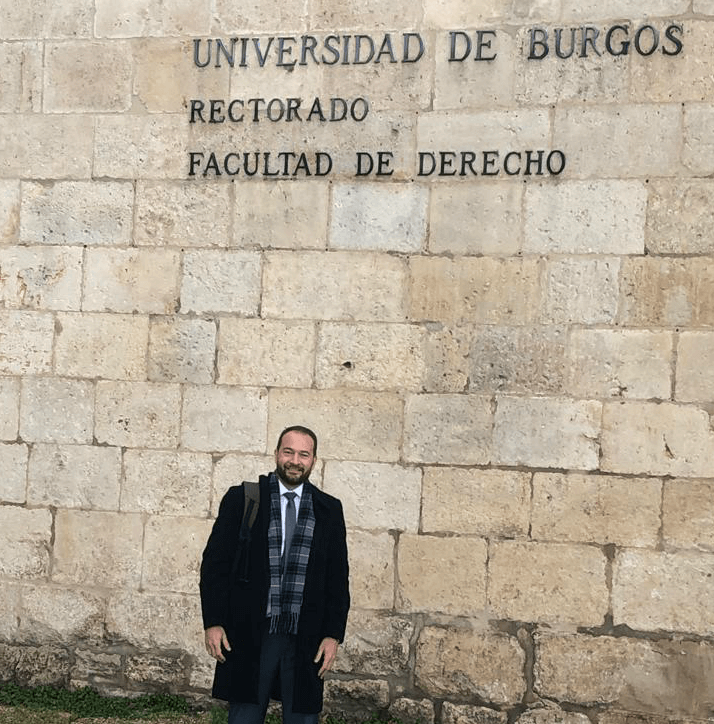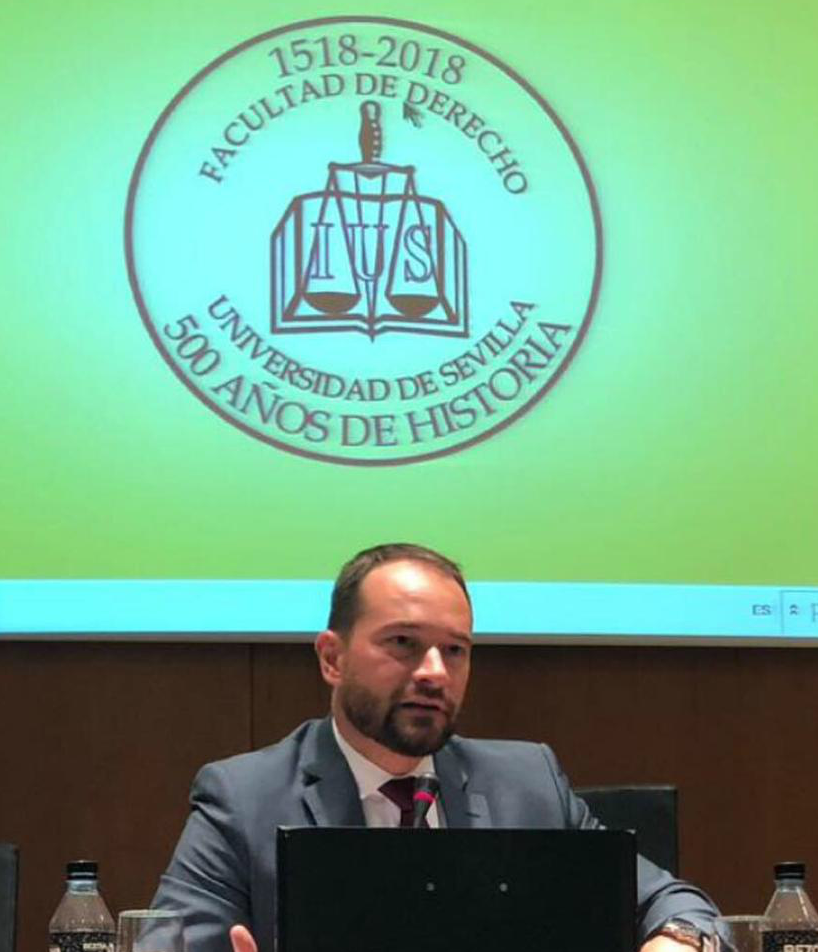Postdoc research at University of Seville looked at labor contract termination
 Law School Professor, Dr Eugênio Hainzenreder Júnior went to Spain to work on his postdoctoral research at the University of Seville. In his investigation, he looked at the similarities and differences between labor contract termination in Brazil and Spain. In Spain, for instance, one the main differences lies in the fact that employees can be dismissed without a specific reason and will not rely on the support of the law. In his view, investigating labor contract termination in the legal system of a country that has seen major labor reforms recently, especially after the 2008 economic meltdown, can bring important contributions to studies in this area in Brazil – as the country is experiencing a similar scenario – in view of the changes that have taken effect after the labor law reform.
Law School Professor, Dr Eugênio Hainzenreder Júnior went to Spain to work on his postdoctoral research at the University of Seville. In his investigation, he looked at the similarities and differences between labor contract termination in Brazil and Spain. In Spain, for instance, one the main differences lies in the fact that employees can be dismissed without a specific reason and will not rely on the support of the law. In his view, investigating labor contract termination in the legal system of a country that has seen major labor reforms recently, especially after the 2008 economic meltdown, can bring important contributions to studies in this area in Brazil – as the country is experiencing a similar scenario – in view of the changes that have taken effect after the labor law reform.
“This is an area I’ve always been interested in, since labor is an area of extreme importance both at the legal and academic levels. Jobs are important for individuals as they will give them the possibility to provide for themselves for and their families and also access to leisure, health care, education, personal and professional achievements as well as everything else that is needed for the dignity of the human person, as stated in the Federal Constitution”, he says.
Differences between Brazil and Spain
Unlike in Brazil, in Spain employees cannot be dismissed without any motivation or justification. The Federal Constitution of 1988 has implemented the Government Severance Indemnity Fund for Employees – FGTS for all individuals. This new system replaced the previous system which ensured stability for employees after ten years of contract. Consequently, contract termination is not regulated by the law. On the other hand, terminated employees will be entitled to a severance in the amount of 40% of their FGTS, as stated in Article 7 of the Constitution.
Contrary to that, in Spain, there must be a reason for termination. As stated in Article 4 of International Labor Organization Convention No. 158, dated 1982, the employment of a worker shall not be terminated unless there is a valid reason for such termination connected with the capacity or conduct of the worker or based on the operational requirements of the undertaking, establishment or service. Alternatively, companies may use their operational needs as a motivation for termination. Additionally, when termination is connected with the capacity or conduct of the worker, they must be provided an opportunity to defend themselves against the allegations made. “In Spain, if employees find their termination unfair, they can appeal against it. Bearing in mind that there was no reason for the termination of a labor contract, the termination will be deemed invalid and employers will indemnify the employee or get them back to the job”, he says.
International visibility
 During his stay in Spain, Hainzenreder Júnior took part in a number of events, courses, seminars, congresses and symposia in several universities, such as the 10º Encuentro Hispano-Brasileño de Filosofía del Derecho y Derechos Humanos, in tribute to the 500th anniversary of the School of Law of the University of Seville. He also attended conferences at the 3ª Jornadas Internacionales Hispano-Brasileñas, in Burgos; at the Congresso Internacional Problemas actuales de la cultura jurídica en el contexto global, in Tenerife and at the 3rd Colóquio Hispano-Brasileiro de Direito do Trabalho e Reformas, in Madrid. He also gave a lecture at the University of Parma.
During his stay in Spain, Hainzenreder Júnior took part in a number of events, courses, seminars, congresses and symposia in several universities, such as the 10º Encuentro Hispano-Brasileño de Filosofía del Derecho y Derechos Humanos, in tribute to the 500th anniversary of the School of Law of the University of Seville. He also attended conferences at the 3ª Jornadas Internacionales Hispano-Brasileñas, in Burgos; at the Congresso Internacional Problemas actuales de la cultura jurídica en el contexto global, in Tenerife and at the 3rd Colóquio Hispano-Brasileiro de Direito do Trabalho e Reformas, in Madrid. He also gave a lecture at the University of Parma.
To his mind, PUCRS enjoys very good visibility internationally and these events are very useful for the University’s reputation and popularity overseas. “Having Law School professors in these events will help promote the quality of the institution and strengthen the ties with other universities. They also promote the mobility of our students to different countries, as being a PUCRS student will open their doors for research and studies”, he adds.
The congresses and events outside of the country bring PUCRS many benefits, such as the maintenance of existing agreements, including the one with the University of Parma, as well as other congresses and projects to be developed with international faculty. A number of Law books and articles have been published following these events. In January, a labor reform congress at the University of Parma was organized by the professors of PUCRS’ Law School Dr Denise Pires Fincato and Dr Gilberto Stürmer.
Classroom effects
 This is not Hainzenreder Júnior’s first time in Spain, as he had done a doctoral internship in 2015. The Labor Law and Labor Procedure Professor claims that these experiences are shared with students as they learn about the Spanish Labor Law and the political and cultural aspects. “Both this postdoc experience and the other learning experiences I had in Spain have been very fruitful to me, as I grew a lot as a person. They make me want to me around my students since it is in the classroom that I have personal and professional achievement. I learn something new every day and I share the values of work, study and respect to people, humbleness and Marist values with those around me”, he says. Hainzenreder Júnior began his career at PUCRS at the age of 17 as a Law School student and started teaching at the age of 25.
This is not Hainzenreder Júnior’s first time in Spain, as he had done a doctoral internship in 2015. The Labor Law and Labor Procedure Professor claims that these experiences are shared with students as they learn about the Spanish Labor Law and the political and cultural aspects. “Both this postdoc experience and the other learning experiences I had in Spain have been very fruitful to me, as I grew a lot as a person. They make me want to me around my students since it is in the classroom that I have personal and professional achievement. I learn something new every day and I share the values of work, study and respect to people, humbleness and Marist values with those around me”, he says. Hainzenreder Júnior began his career at PUCRS at the age of 17 as a Law School student and started teaching at the age of 25.